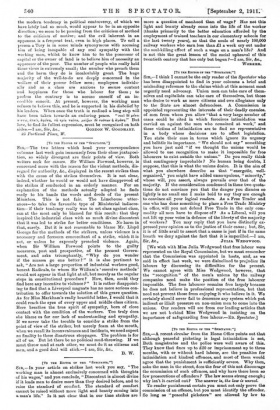[To THE EDITOR OF THE " SPECTATOR. "]
Sta,—The two letters which head your correspondence columns last week gain immensely from their close juxtaposi- tion, so widely divergent are their points of view. Both writers seek for causes. Sir William Forwood, however, is concerned more with the reason for the violent methods, dis- regard for authority, &c., displayed in the recent strikes than with the cause of the strikes themselves. It is not clear, indeed, whether be would or would not have disapproved of the strikes if conducted in an orderly manner. For an explanation of the methods actually adopted he finds ready to his hands the words and deeds of the present Ministers. This is not fair. The Limehouse utter- ances—to take the favourite type of Ministerial indiscre- tion—if their tendency really was to set class against class, can at the most only be blamed for this result: that they inspired the industrial class with so much divine discontent that it was led to strike for better conditions. No harm in that, surely. But it is not reasonable to blame Mr. Lloyd George for the methods of the strikers, unless violence is a necessary and foreseen concomitant of a strike, which it is not, or unless he expressly preached violence. Again, when Sir William Forwood points to the guilty measures, past and prospective, of the present Govern- ment, and asks triumphantly, " Why do you wonder if the masses go one better ? " it is also pertinent to ask, "Are not a large proportion of industrial workers good, honest Radicals, to whom Sir William's `coercive methods' would not appear in that light at all, but merely as the regular steps in constitutional procedure? How, then, could they find here any incentive to violence P" It is rather disappoint- ing to find that a Liverpool magnate has no more serious con- tribution to offer towards the solution of this grave question. As for Miss Markham's really beautiful letter, I would that it could reach the eyes of every upper and middle class citizen. Here breathes the true spirit of sympathy, born of close contact with the condition of the workers. Too truly does she blame us for our lack of understanding and sympathy. If we never take the trouble to consider a strike from the point of view of the striker, but merely foam at the mouth, when we recall its inconveniences and incidents, we need expect no finality to these disastrous stoppages. The problem is for all of us. But let there be no political mud-throwing. If we must throw mud at each other, we must do it as citizens and men, and a good deal will stick.—I am, Sir, &c., B. W.






































 Previous page
Previous page